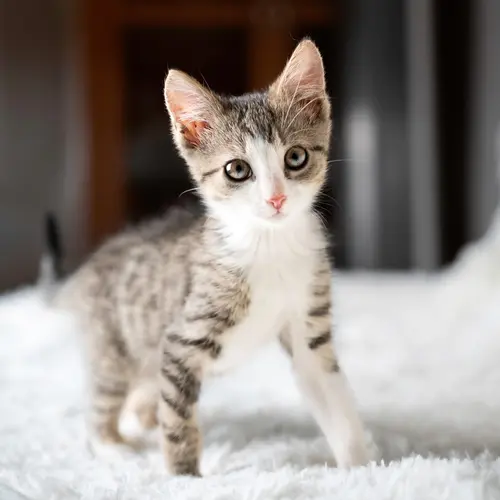Hyperthyroidism is a common disease in cats caused by the overproduction of thyroid hormone by the thyroid glands. Hyperthyroidism most commonly occurs in cats around the age of 13.
Cats have two thyroid glands in their neck that help regulate metabolism. Sometimes these glands can expand and overproduce thyroid hormone. This can be problematic because thyroid hormone affects other organs in the cat’s body, most significantly the heart.
Most of the time, an enlarged thyroid gland is caused by a noncancerous tumor, though in rare cases hyperthyroidism can be an indicator of cancer. If you suspect that your cat has an enlarged gland in their neck, contact your veterinarian right away.
In most cases, hyperthyroidism in cats can be treated successfully and your cat can live a long and healthy life.
What Are the Symptoms of Hyperthyroidism in Cats?
Hyperthyroidism symptoms in cats may be subtle in the beginning but over time can become increasingly more severe. Symptoms can include:
- Weight loss despite an increased, sometimes insatiable appetite
- Increased thirst
- Increased urination (sometimes in inappropriate places like outside of the litter box)
- Vomiting
- Diarrhea
- Restlessness/hyperactivity
- Aggressive behavior
- Difficulty breathing
- Weakness
- Depression
- Greasy or matted hair
What Breeds Are Prone to Hyperthyroidism?
Any breed of cat can experience hyperthyroidism, especially as they get older. No specific breed is known to have a greater risk of hyperthyroidism, though some breeds such as Siamese, Persian, and Himalayan cats appear to experience the disease less compared with others.
How Is Hyperthyroidism in Cats Diagnosed?
To diagnose hyperthyroidism, your veterinarian will begin by giving your cat a physical exam and checking the cat’s neck for an enlarged thyroid gland.
If the veterinarian suspects that your cat has hyperthyroidism, they will likely conduct a few more tests, such as:
- A blood chemistry panel that measures thyroid hormone levels (most cats will have an elevated amount of thyroid hormone in their bloodstream)
- A urine test
- An ultrasound of the heart
Hyperthyroidism can sometimes predispose a cat to develop other medical conditions. For instance, two complications of hyperthyroidism in cats are high blood pressure and heart disease. Your veterinarian will check for these conditions and evaluate your cat’s overall health.
How Is Hyperthyroidism in Cats Treated?
There are a few different treatment options available for cats diagnosed with hyperthyroidism. Your veterinarian can help you choose the treatment that is best for you and your cat. Treatment options include:
Medication. Anti-thyroid drugs can help reduce the production of thyroid hormones in cats. The drug most commonly is provided as a twice-daily medication that must be given for the remainder of the cat's life. Anti-thyroid drugs may also come in the form of a gel, which can be applied to the skin. While the medication is relatively inexpensive, your cat may experience side effects like vomiting, fever, low energy, weight loss, and facial itching (which indicates the cat cannot tolerate the medication).
Radioactive iodine therapy. This treatment involves injecting your cat with iodine directly into their bloodstream. The cat’s thyroid absorbs the iodine and the radiation destroys any abnormal thyroid tissue, without damaging other tissues in the cat’s body. The majority of cats get back to normal hormone levels within a few weeks of receiving the treatment.
This treatment is done only at specialty radiotherapy facilities. After the therapy is administered, cats are kept in the hospital for a short period. When the cat returns home, they must be isolated due to the radioactive nature of the treatment.
Surgery. This treatment option involves surgically removing the cat’s thyroid. It has a good success rate and can eliminate the need for long-term medication. It does require your cat to undergo anesthesia, though, which could pose a higher risk for older cats.
Dietary therapy. Some medical studies recommend having limitations on the amount of iodine in your cat's diet to help treat and prevent hyperthyroidism. Research regarding this treatment option is still ongoing, and it is not a guaranteed solution. Before limiting iodine in your cat’s diet, it’s important to talk with your veterinarian.
Prognosis/Life Expectancy
The outcome of most cat hyperthyroidism treatments is excellent. Even if your cat is older, hyperthyroidism can still be treated, and your cat can have a healthy life. For instance, cats who receive radioactive iodine therapy usually return to normal within a few weeks, while cats treated with medication or put on a special diet do well as long as the drug or diet is given consistently and they receive regular checkups.
If you suspect that your cat has hyperthyroidism, there is an excellent chance your veterinarian can find the right therapy and get your cat back to feeling good faster than you’d think.
